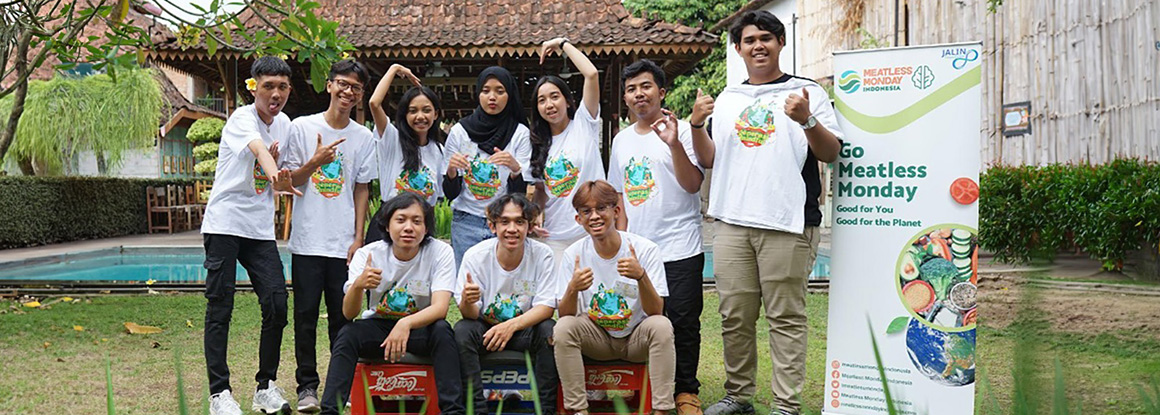
Program Overview: The non-profit Jalin Foundation uses social and behavioral change approaches to improve the quality of life among Indonesian people. In implementing Meatless Monday, Jalin considered that Indonesia is still experiencing the multiple burdens of malnutrition, rising obesity, and non-communicable diseases. It also considered Indonesia’s commitments under the UN Sustainable Development Goals and the Paris Agreement on Climate Change.
Objectives: Meatless Monday Indonesia (MMI) aimed to increase the consumption of local plant-based food. The emphasis on local food connected the program to an Indonesian audience and their dietary preferences. MMI also worked to ensure that all partners had a shared vision and understanding of the project’s goals.
Process: MMI developed unique Meatless Monday logos to express the Indonesia-specific nature of the program, which involved pretesting and receiving feedback from its audience. The final logo incorporates a pair of mustard green leaves (or sawi, in Indonesian language). This common Indonesian vegetable symbolizes a new beginning of a healthier or greener lifestyle.
The organizers collaborated with local social media influencers and restaurants – including two restaurant chains – to promote the project through recook challenges, webinars, special meatless menus on Mondays, and other platforms. They also created innovative partnerships, such as with Torajamelo, which empowers rural women weavers and promotes both sustainable fashion and traditional weaving. The partnership boosted MMI’s credibility and aligned it with recognized sustainability efforts while connecting it to Torajamelo’s existing social network. They also partnered with DAAI TV, which provided access to a broad, nationwide audience.
Outcome: Participants in the program considered Meatless Monday valuable and relevant, particularly due to its association with environmental conservation, and reported increased motivation to reduce meat consumption, as well as increased awareness of the importance of consuming vegetables and plant-based proteins. They mentioned positive changes in their health that included reduced acne, weight loss, increased energy, and decreased foot pain.
People accustomed to cooking found it easier to prepare meatless meals, but those with limited cooking experience or knowledge of plant-based food required additional education and support. There was also more receptivity in urban areas, where people are more aware of healthy lifestyles (which might include reducing meat consumption), have more affluence, and have access to varied plant-based options.
The project also found that connecting general health to environmental issues, particularly climate change, resulted in more positive responses from participants.
At a stakeholder meeting, journalist Hairum Fellayati of Hipwee, Indonesia, summed it up: “It’s not just for us but also the Earth. One person might not make a difference but imagine if one million or two million people joined Meatless Monday — how beneficial that would be as a way to show our gratitude to the Earth, making it a more comfortable place to live and making us and the Earth healthier and happier.”

